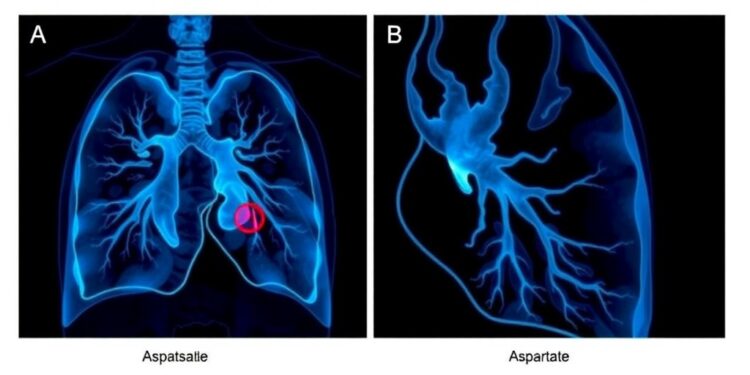Scientists have uncovered a transformative mechanism that explains the aggressive behavior of lung metastases in breast cancer. The research, published in Nature on January 1, 2025, reveals how aspartate, a seemingly ordinary amino acid, plays a pivotal role in enhancing the aggressiveness of metastases by activating a complex translational program within cancer cells. This discovery sheds light on the intricate interplay between nutrient availability, cellular signaling, and tumor biology, opening new avenues for therapeutic interventions.
Lung metastases occur in over half of patients with metastatic tumors, often due to the lung’s unique physical and biochemical environment. The study highlights the ability of primary tumors to secrete factors that prime the lung for metastases by modifying immune cells, the extracellular matrix, and nutrient composition. Among these nutrients, aspartate emerged as a key player. Researchers observed that patients and mice with breast cancer exhibited elevated levels of aspartate in lung interstitial fluid, which was not replicated in other organs.
Aspartate’s journey from a metabolic byproduct to a potent signaling molecule begins with its interaction with the N-methyl-D-aspartate (NMDA) receptor on cancer cells. This receptor, traditionally associated with neurotransmission in the brain, was found to be highly expressed in lung-disseminated cancer cells. The aspartate binding activates NMDA receptor signaling, triggering the phosphorylation of the transcription factor CREB. This, in turn, upregulates the expression of deoxyhypusine hydroxylase (DOHH), an enzyme critical for hypusination—a post-translational modification exclusive to the translation initiation factor eIF5A. This modification enables eIF5A to drive an alternative translational program that centralizes around TGFβ signaling.
TGFβ signaling was found to promote collagen synthesis in metastatic cancer cells, enhancing their invasive and metastatic potential. Collagen not only serves as a structural component but also reshapes the tumor microenvironment, creating a feedback loop that supports further tumor progression. The study demonstrated that silencing DOHH or NMDA receptor subunit GRIN2D in cancer cells significantly reduced lung metastasis aggressiveness, highlighting their critical roles in this pathway.
To investigate the broader implications of aspartate signaling, the researchers conducted single-cell RNA sequencing (scRNA-seq) of lung metastases. They observed a marked enrichment of gene sets associated with increased translation in cancer cells from lungs primed with tumor-secreted factors (TSFs). This translational upregulation was attributed to eIF5A hypusination, as evidenced by increased hypusine detection in metastatic tissues. Further experiments confirmed that aspartate-induced eIF5A hypusination drives this process, as reducing hypusination abrogated the aggressive phenotype.
In vivo studies underscored the importance of aspartate in shaping the metastatic landscape. Mice pre-treated with aspartate exhibited elevated eIF5A hypusination and an increase in lung metastases. Moreover, treating these mice with memantine, an NMDA receptor inhibitor, significantly curtailed metastasis aggressiveness. This finding aligns with observations from human breast cancer patients, where lung metastases showed elevated GRIN2D expression, hypusine levels, and collagen deposition compared to other metastatic sites.
The study also employed innovative culture systems to replicate the lung microenvironment. Tumor spheroids grown in lung-like medium supplemented with aspartate exhibited increased eIF5A hypusination and aggressive growth patterns. These effects were reversed by targeting the NMDA receptor or eIF5A, reinforcing the centrality of this pathway.
A striking aspect of the research was its focus on clinical applicability. The presence of elevated aspartate levels in lung interstitial fluid from patients and the identification of NMDA receptor inhibitors such as memantine as potential therapeutic agents underscore the translational potential of these findings. The study’s authors propose that targeting the NMDA receptor or DOHH could be an effective strategy to combat lung metastases.
The implications of this work extend beyond breast cancer. The researchers hypothesize that aspartate’s role as a signaling molecule could be relevant in other cancers that metastasize to the lung. This possibility opens new research avenues to explore nutrient-driven metastasis mechanisms in different tumor types.
This study unveils a paradigm-shifting role for aspartate in lung metastasis. By functioning as an extracellular signaling molecule, aspartate activates a cascade of events that culminates in aggressive tumor behavior. These findings not only deepen our understanding of metastatic biology but also pave the way for novel therapeutic approaches targeting nutrient signaling pathways in cancer.
Subject of Research: Cancer biology, metastasis, signaling pathways, translational regulation
Article Title: Aspartate signalling drives lung metastasis via alternative translation
News Publication Date: 01 January 2025
Article Doi References: 10.1038/s41586-025-00001-x
Image Credits: None provided in the study
Keywords: Aspartate, NMDA receptor, eIF5A hypusination, lung metastasis, TGFβ signaling, cancer aggressiveness, collagen synthesis, nutrient signaling, breast cancer





